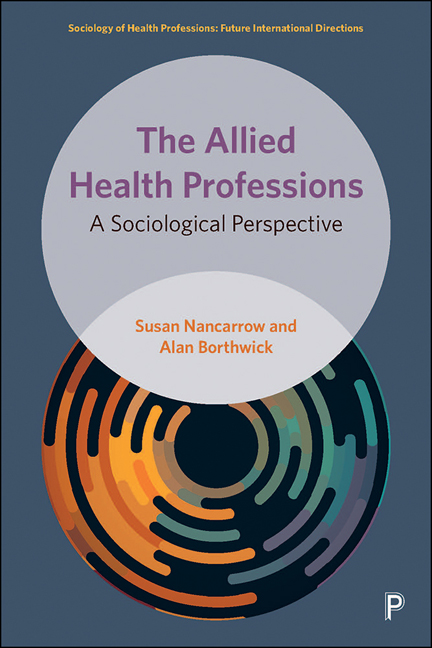Book contents
- Frontmatter
- Contents
- List of abbreviations
- Acknowledgements
- Editors’ overview
- Introduction
- 1 The allied health collective
- 2 Diversity in the allied health professions
- 3 The established allied health professions
- 4 Emerging allied health professions
- 5 The support workforce within the allied health division of labour
- 6 Specialisation in allied health
- 7 Post-professionalism and allied health
- Conclusion
- References
- Index
4 - Emerging allied health professions
Published online by Cambridge University Press: 05 January 2022
- Frontmatter
- Contents
- List of abbreviations
- Acknowledgements
- Editors’ overview
- Introduction
- 1 The allied health collective
- 2 Diversity in the allied health professions
- 3 The established allied health professions
- 4 Emerging allied health professions
- 5 The support workforce within the allied health division of labour
- 6 Specialisation in allied health
- 7 Post-professionalism and allied health
- Conclusion
- References
- Index
Summary
The health professions are in a constant state of growth and evolution, with new professions continuing to emerge, many in response to new techniques and technologies, and being included under the umbrella of allied health. This chapter explores the emergent allied health occupations, that is, those groups that have recently achieved a level of consistency of title and organisation to then pursue professionalism.
Examples of occupations that have professionalised since the middle of the 20th century include exercise physiologists, rehabilitation counsellors, ODPs, DEs, genetic counsellors, perfusionists and sonographers. In 2020, AHPA introduced affiliate membership for a range of professions, including some emerging ones, for example, lymphoedema therapists, counsellors, diabetes educators, hand therapists, dermal clinicians, hearing aid audiologists, myotherapists, pedorthists, psychotherapists and spiritual counsellors. Not all these professions are recognised allied health professions in all jurisdictions.
A notable exception to the recognition of new allied health professions is the NHS. When the Professions Supplementary to Medicine Act 1960 was introduced, 12 professions were recognised. At the start of 2020, the NHS formally recognised 14 allied health professions: arts therapy, chiropody (now podiatry), dietetics, dramatherapy, medical laboratory sciences, music therapy, occupational therapy, orthoptics, physiotherapy, radiography, prosthetics and orthotics, speech and language therapy, clinical sciences, and paramedics (Larkin, 2002). Since 2005, just after the formation of the HPC, the recognised allied health professions in the UK have remained relatively stable. An important contribution of this chapter is the way that regulatory frameworks and funding structures influence the development of new professions.
There is limited published literature on the history and sociology of emerging professions. Some of the new professions (sonographers, perfusionists and genetic counsellors) have emerged as a direct response to new technologies. For example, perfusionists are responsible for operating the cardiopulmonary bypass machine during cardiac surgery, a technology that was first applied in the 1950s (Arsenault, 2000). Diagnostic sonography developed rapidly during the 1950s, and established the basis for the growth of the imaging profession (Hassall, 2007).
The dominant, largely neo-Weberian theories of professionalisation from the 20th century focused on the ways that occupational groups enhanced their status by staking a claim to a body of knowledge and preventing encroachment by others (Saks, 1983; Witz, 1992; Harrits, 2014).
- Type
- Chapter
- Information
- The Allied Health ProfessionsA Sociological Perspective, pp. 107 - 130Publisher: Bristol University PressPrint publication year: 2021



